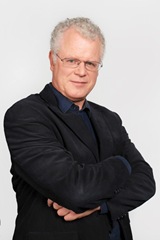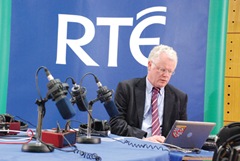Cathal Mac Coille
 Cathal Mac Coille’s voice is the one we hear interrogating politicians and public figures on Morning Ireland most days. Here, he tells eolas about getting up at 4.22am and how to ask the right questions.
Cathal Mac Coille’s voice is the one we hear interrogating politicians and public figures on Morning Ireland most days. Here, he tells eolas about getting up at 4.22am and how to ask the right questions.
Describe how your education and career path led you to your current position.
I’m the classical journalist who found his way to the position that I’m now in by thinking and realising that I wasn’t capable of doing anything else. When I was in UCD studying history I wanted to be a teacher but I didn’t think I’d be up to it. In college I saw a notice for researchers in RTÉ radio and I applied for that.
I started doing some broadcasting as well as reporting on radio. Then, in 1975 I got a job working as a journalist on the Irish desk in the newsroom. I went to Belfast from 1978-1984. When I came back to Dublin I worked on the lunchtime news on radio, then as a reporter on Morning Ireland. In 1986 I was asked to do my first spell as Morning Ireland presenter. I spent four years there and then I went to the Sunday Tribune. I spent five very happy years there. I was asked to take a position as a political correspondent with TG4 when it was formed in 1996. Then I was asked to come back to Morning Ireland in 2001. I’ve been there since.
How did you find the move from broadcast to print journalism?
Exciting and thrilling. I was not the world’s greatest print journalist but I learned a lot. In broadcast journalism everything is about brevity and clarity. Clarity applies to all journalism but when you have to boil things down to their essentials it’s a different set of skills.
The other aspect of broadcast journalism is that it has to cohere as a story. What I tell you in ten seconds time has to build on what I tell you now, whereas you have more options all the time in print journalism.
What makes a good radio news story?
Radio is good at telling stories and it’s good at not only conveying opinion but also exploring it and questioning it and discussing it. It’s less good when you can talk about it on radio but television can show you it. Things which are very obviously physical are problematic for radio.
The first thing that you need is somebody who wants to talk, explain, who wants the people who are listening to understand what’s happening and why it’s happening.
Describe your typical working day.
My day begins at 4.22am when the first of my two alarm clocks goes off. I cycle to work, listening on one headphone only, to the RTE 5am headlines and the BBC World Service until 5.30am, by which time I’m in work. That briefs me on the main news stories.
On most mornings 80-90 per cent of what I’ll be doing is already decided. On most cases there is a slim folder of material which relates to the person I’ll be interviewing or the subject I’m going to be covering. We have a very brief discussion at 6.30am on what we need to change, then the programme starts.
If you have a major news story or a major interview, you need to think about it, what needs to be asked, how you are to ask it, whether it’s going to be reasonable in the circumstances. If difficult questions need to be asked you need to think about how to ask those (particularly if you’re with politicians) in ways that are not going to lead to useless or unproductive discussions, to ask the question that people will want asked and to get the answer to it.
At nine o’clock we have a very quick de- briefing session. After that we go to breakfast. Then I come back and it’s a question of discussing something that needs to be set up for the next day. Sometimes I write a blog. I might sometimes go to a Dáil committee if I can.
I do a fair bit of reading. There is a set number of papers I read every day and various websites that I’m interested in. I couldn’t get through the length of that day – with some heavy work to be done at the beginning of it and end of it – without lying down on the sofa and taking an hour’s rest.
In the evening we have a phone conference. It’s not compulsory but nine days out of ten I take part in it at 8.20pm, and that’s really a survey of where the night editor is at in terms of the following day’s programming and discussion of any other ideas. I always watch the 6.01 or 9 o’clock news and Primetime. Subsequent to the phone conference, there may well be something sent to me to read and to think about for the following day.
 What three stories or interviews stand out from your career?
What three stories or interviews stand out from your career?
The first is an interview I did with the former Taoiseach Brian Cowen during the Fianna Fáil think-in last September, when people felt that his performance was of someone who had been up late. To me, I didn’t think it was a particularly brilliant or revealing interview, but what it revealed was how seriously everybody involved in this process needs to take it.
The second thing that it revealed to me was the difference between radio and television. On radio people have nothing to go on except what you say and how you say it. It boils down to your voice and what the content of that voice is telling people.
The second is a wonderful television story from when I was working in RTÉ in Belfast. The engine of a Larne to Stranraer ferry failed in a force ten gale, which blew it back on to the Antrim coast. It went within half a mile of a very rocky coastline and eventually they got a tug to it and they pulled it off. I was interviewing passengers as they were being winched off. Having interviewed nine or ten people – from Scotland, England and Northern Ireland – somebody tapped me on the shoulder and said: ‘You haven’t been talking to the two girls from Cork, have you?’ I said: ‘No, where are they?’ I interviewed them and that made the story for my audience on RTÉ. The relevance of that is all journalism is local.
The third interview was important at the time and very difficult for me. I did an interview about 15 years ago with the late Séamus Brennan, who was a Fianna Fáil Minister. He’d made a decision as Minister for Transport about access to air routes into and out of Ireland. In an open and speculative way I asked him whether he had received any donations from Ryanair. He hadn’t, but it caused an enormous storm. I didn’t know it at the time but the whole issue of political donations played a much bigger role in our politics at the time than I realised. You have to be very careful if you’re asking a question. If it is an open and speculative question you’ve got to say so, as opposed to a question in which people assume he knows something or he’s alleging something. It was quite a stormy controversy. I look back on it now as a good question asked in a bad way.
How has the public’s relationship with politicians changed over the years?
When I look back now, 10 years ago people had no illusions about politicians. Essentially they thought, one way or another, they know how to run the country. I think that’s gone now. There
’s an overall feeling on the part of the public that politicians can’t be trusted to run the country, won’t tell the truth and will break promises that they make.
How do you relax in your spare time?
Firstly, I cycle. I do a certain amount of swimming and I go to hurling matches. I read, listen to music and am a big fan of the RTÉ National Symphony Orchestra, and I go to the cinema.





